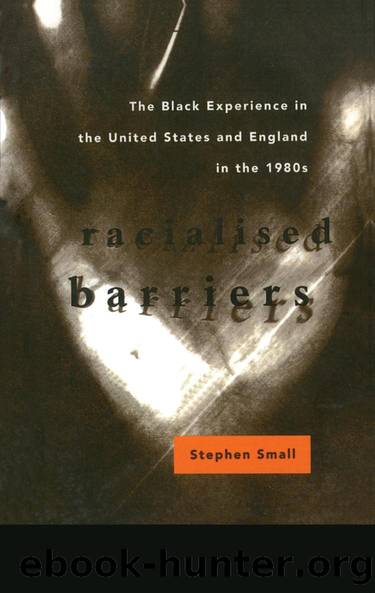Racialised Barriers by Stephen Small

Author:Stephen Small [Small, Stephen]
Language: eng
Format: epub
ISBN: 9780415077262
Barnesnoble:
Goodreads: 2777133
Publisher: Routledge
Published: 1994-09-01T00:00:00+00:00
CLASS CLEAVAGE IN ENGLAND
There is no such thing as a black-qua-black movement any more. There are middle-class blacks fighting for a place in the (white) middle-class sun and there are workless and working-class blacks fighting for survival and basic freedoms.
(Sivanandan, 1990: 125)
There has been increasing interest in the growing stratification in the Black population in England during the 1980s. Initially most analysts concentrated on the dire circumstances of working-class and workless Blacks, particularly the young and those in poverty (Rex, 1988). But attention has now turned to the growth of Black businesses and the segment of the African-Caribbean population that has established their own businesses or broken through the glass ceiling into management and professional occupations (Ward and Jenkins, 1984; Platt, 1986).7
Data are not collected specifically on the Black âmiddle classâ in England, they are inferred from more general data on socioeconomic status, such as self-employed workers, professionals, and non-manual workers. These data are limited though consistent. In his 1982 survey, Brown reported that for men, self-employment ran at the level of 14 per cent of whites and 7 per cent of African-Caribbeans (Brown, 1984). For women it was 7 per cent for whites and 1 per cent for African-Caribbeans (ibid.: 165). Among the top categories of employees Brown reported that for men âthe proportion in the top SEG category in the table (employers, managers and professional workers) is 19 per cent for whites and only five per cent for West Indiansâ (ibid.). For women, the proportion in the top SEG was only 1 per cent (with 52 per cent in the âother non-manualâ category) (ibid.: Table 92, 198). Further data are available from the Labour Force Survey (Employment Gazette, 1989). For the years 1989â91 the Labour Force Survey reported the following findings: for West Indian and Guyanese men there was 4 per cent in the professional category, 8 per cent in employers/managers and 18 per cent for other non-manual. For women, the numbers were too small to report for the professional category, with 9 per cent for employers/managers and 51 per cent in other non-manual, the latter clearly reflecting the large numbers of African-Caribbean women in nursing (Labour Force Survey, 1992: Table 6.35, 36).8
Regarding the African-Caribbean âmiddle classâ in general in the 1980s we can therefore arrive at several main conclusions: the numbers were small but steadily increasing; the group was considerably smaller proportionately than that of its white counterparts; there were small but significant numbers of women in this group. It is unclear whether, in the present economic climate, the numbers will grow to any significant extent. While we can reasonably assume that their numbers will not increase dramatically we can also be sure that members of this group will strive to confer the various advantages they enjoy upon their offspring.
The African-Caribbean population generally seemed to rush to embrace the growth of a âmiddle classâ group. Having experienced substantial discrimination in their efforts to survive and succeed, and displaying many of the values of the capitalist society into
Download
This site does not store any files on its server. We only index and link to content provided by other sites. Please contact the content providers to delete copyright contents if any and email us, we'll remove relevant links or contents immediately.
Down the Drain by Julia Fox(975)
The Light We Carry by Michelle Obama(898)
Cher by Cher(797)
Simple Passion by Annie Ernaux(746)
Love, Pamela by Pamela Anderson(602)
The Nazis Knew My Name by Magda Hellinger & Maya Lee(578)
Zen Under Fire by Marianne Elliott(562)
You're That Bitch by Bretman Rock(551)
Novelist as a Vocation by Haruki Murakami(542)
Alone Together: Sailing Solo to Hawaii and Beyond by Christian Williams(532)
The Foxfire Book of Appalachian Women by Kami Ahrens(531)
Kamala Harris by Chidanand Rajghatta(496)
Gambling Man by Lionel Barber(487)
The Barn by Wright Thompson(435)
Drinking Games by Sarah Levy(428)
A Renaissance of Our Own by Rachel E. Cargle(418)
Limitless by Mallory Weggemann(417)
Memoirs of an Indian Woman by Shudha Mazumdar Geraldine Hancock Forbes(415)
A new method to evaluate the dose-effect relationship of a TCM formula Gegen Qinlian Decoction: âFocusâ mode of integrated biomarkers by unknow(415)
